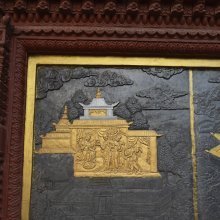Trengwa, Threngwa: 1 definition
Introduction:
Trengwa means something in the history of ancient India. If you want to know the exact meaning, history, etymology or English translation of this term then check out the descriptions on this page. Add your comment or reference to a book if you want to contribute to this summary article.
Images (photo gallery)
India history and geography
Source: Mandala Texts: Trengwa: Prayer BeadsTrengwa or Threngwa (ཕྲེང་བ་) refers to “prayer beads”.—Rosaries for prayers are a very common item of religious artefacts in Bhutan and Bhutanese people profusely use rosaries to say prayers and recite mantras. Known as chyem (ཕྱེངམ་) in Dzongkha and threngwa (ཕྲེང་བ་), religious texts explain that the term originally refers to yearning in the mind. The rosary is used to inculcate in the mind a yearning for the blessings of the Buddhas and yidam deities. As a fundamental religious implement, there are many tantric texts which discuss the raw materials, size, shape, number of beads, mode of use and significance of the different rosaries. [...] The rosary has a primary bead known as dozin (མདོ་འཛིན་), which is larger than the rest of the beads.

The history of India traces the identification of countries, villages, towns and other regions of India, as well as mythology, zoology, royal dynasties, rulers, tribes, local festivities and traditions and regional languages. Ancient India enjoyed religious freedom and encourages the path of Dharma, a concept common to Buddhism, Hinduism, and Jainism.
See also (Relevant definitions)
Relevant text
Search found 2 books and stories containing Trengwa, Threngwa; (plurals include: Trengwas, Threngwas). You can also click to the full overview containing English textual excerpts. Below are direct links for the most relevant articles:
Tibet (Myth, Religion and History) (by Tsewang Gyalpo Arya)
5. Early Bon and Later Buddhist -Amalgamation < [Chapter 3 - Nyatri Tsanpo; The First King of Tibet]
Bodhisattvacharyavatara (by Andreas Kretschmar)
